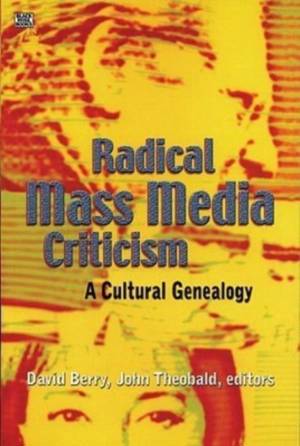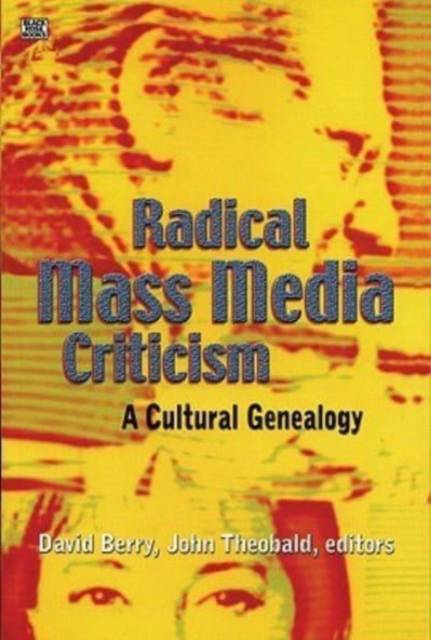
- Afhalen na 1 uur in een winkel met voorraad
- Gratis thuislevering in België vanaf € 30
- Ruim aanbod met 7 miljoen producten
- Afhalen na 1 uur in een winkel met voorraad
- Gratis thuislevering in België vanaf € 30
- Ruim aanbod met 7 miljoen producten
Zoeken
€ 25,45
+ 50 punten
Omschrijving
"In the beginning was the press, and then the world appeared." --Karl Kraus Since the beginning of the media age, there have been thinkers who have reacted against the increasing power of the mass media and perceived its ever more pervasive role in historical development. This book examines those early mass media critics, and their controversial writings, and links them with their contemporaries to demonstrate the relevance of their legacy for today's debates on media power and media ethics. Included in this book is a look at the work of Karl Kraus and his devastating critiques of the role of corrupt journalism in the First World War; at Ferdinand Tönnies' provocative analysis of the relationship between public opinion and propaganda; and at the 'Frankfurt School, ' especially Max Horkheimer and Theodor Adorno, in the shadow of the experience of Nazism. The Glasgow Media Group unmasks ideological bias in apparently objective news and current affairs media coverage. The importance and influence of the much contested figure of Marshall McLuhan is analysed, as is the work of Robert McChesney and the United States' tradition from which his own writing and collaboration with fellow critical intellectuals Noam Chomsky and Edward Herman emerged. From Jesús Martín-Barbero in Colombia, and Nestor Garcia Canclini in Mexico comes a perspective on globalizing mass communications practice. The media-critical work of thinkers such as Harold Innis, Northrop Frye, David Suzuki, Maude Barlow, and the black American feminist writer, bell hooks, make this book truly one of the first full historical surveys of radical mass media criticism. Anthology contributors are a team of leading international experts in the field and include: Slavko Splichal, University of Ljubljana; Hanno Hardt, University of Iowa; Joost van Loon, Nottingham Trent University; Stuart Allen, University of West of England; Jason Barker, Independent Writer and Researcher; John Eldridge, University of Glasgow; Robert McChesney, University of Illinois; James Winter, University of Windsor; Cynthia Carter, Cardiff University Table of Contents Preface
Acknowledgements
Notes On Tile Contributors Chapter One
Radical Mass Media Criticism: An Introduction.
David Berry Chapter Two
The Intellectual Tradition Of Radical Mass Media Criticism: A Framework.
John Theeobald Chapter Three
In Pursuit Of Socialised Press: Ferdinand Tönnies's Critique Of The Press And Its Predecessors
Slavko Splichal Chapter Four
Karl Kraus And Media Commodification Of Language
John Theobald Chapter Five
The Frankfurt School And Aesthetic Discourse: Critical Theory, Art, And The Critique Of (Mass) Communication
Hanno Hardt Chapter Six
Mediating Politics: Jürgen Habermas And The Public Sphere
Jim McGuigan and Stuart Allan Chapter Seven
The Work Of The Glasgow Media Group: An Insider's Story
John Eldridge Chapter Eight
Armand Mattelart: Historicism And Mass Media
Sanda Miller Chapter Nine
Canadian Critical Communication
Robert E. Babe and James P. Winter Chapter Ten
McLuhan And His Influences
Joost Van Loon Chapter Eleven
A Century Of Radical Media Criticism In The USA
Ben Scott and Robert W McChesney Chapter Twelve
Popular Culture And Mass Media In Latin America: Some Reflections On The Works Of Jesus Martin-Barbero And Nestor Garda Canclini
David Berry Chapter Thirteen
The Transformative Power Of Cultural Criticism: bell hooks's Raclical Media Analysis
Cynthia Carter Chapter Fourteen
Dissident Intellectuals And Intellectual Dissidents: Some Concluding Thoughts About Thinking And Acting
John Theobald Index DAVID BERRY is Senior Lecturer in Journalism, Culture and Mass Communications and JOHN THEOBALD is Associate Professor in Modern Languages both at the Southampton Institute, UK. 272 pages, 6x9, bibliography, index
Acknowledgements
Notes On Tile Contributors Chapter One
Radical Mass Media Criticism: An Introduction.
David Berry Chapter Two
The Intellectual Tradition Of Radical Mass Media Criticism: A Framework.
John Theeobald Chapter Three
In Pursuit Of Socialised Press: Ferdinand Tönnies's Critique Of The Press And Its Predecessors
Slavko Splichal Chapter Four
Karl Kraus And Media Commodification Of Language
John Theobald Chapter Five
The Frankfurt School And Aesthetic Discourse: Critical Theory, Art, And The Critique Of (Mass) Communication
Hanno Hardt Chapter Six
Mediating Politics: Jürgen Habermas And The Public Sphere
Jim McGuigan and Stuart Allan Chapter Seven
The Work Of The Glasgow Media Group: An Insider's Story
John Eldridge Chapter Eight
Armand Mattelart: Historicism And Mass Media
Sanda Miller Chapter Nine
Canadian Critical Communication
Robert E. Babe and James P. Winter Chapter Ten
McLuhan And His Influences
Joost Van Loon Chapter Eleven
A Century Of Radical Media Criticism In The USA
Ben Scott and Robert W McChesney Chapter Twelve
Popular Culture And Mass Media In Latin America: Some Reflections On The Works Of Jesus Martin-Barbero And Nestor Garda Canclini
David Berry Chapter Thirteen
The Transformative Power Of Cultural Criticism: bell hooks's Raclical Media Analysis
Cynthia Carter Chapter Fourteen
Dissident Intellectuals And Intellectual Dissidents: Some Concluding Thoughts About Thinking And Acting
John Theobald Index DAVID BERRY is Senior Lecturer in Journalism, Culture and Mass Communications and JOHN THEOBALD is Associate Professor in Modern Languages both at the Southampton Institute, UK. 272 pages, 6x9, bibliography, index
Specificaties
Betrokkenen
- Auteur(s):
- Uitgeverij:
Inhoud
- Aantal bladzijden:
- 272
- Taal:
- Engels
Eigenschappen
- Productcode (EAN):
- 9781551642468
- Verschijningsdatum:
- 1/08/2005
- Uitvoering:
- Paperback
- Formaat:
- Trade paperback (VS)
- Afmetingen:
- 152 mm x 229 mm
- Gewicht:
- 3779 g

Alleen bij Standaard Boekhandel
+ 50 punten op je klantenkaart van Standaard Boekhandel
Beoordelingen
We publiceren alleen reviews die voldoen aan de voorwaarden voor reviews. Bekijk onze voorwaarden voor reviews.











